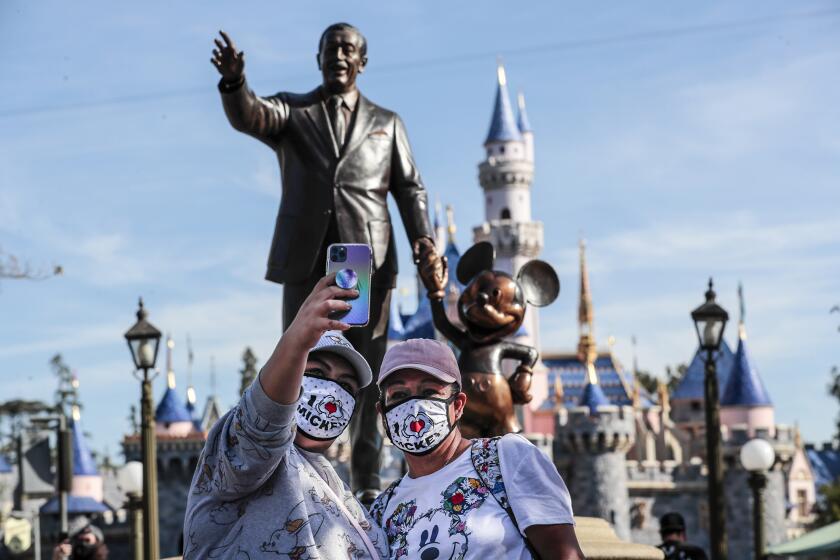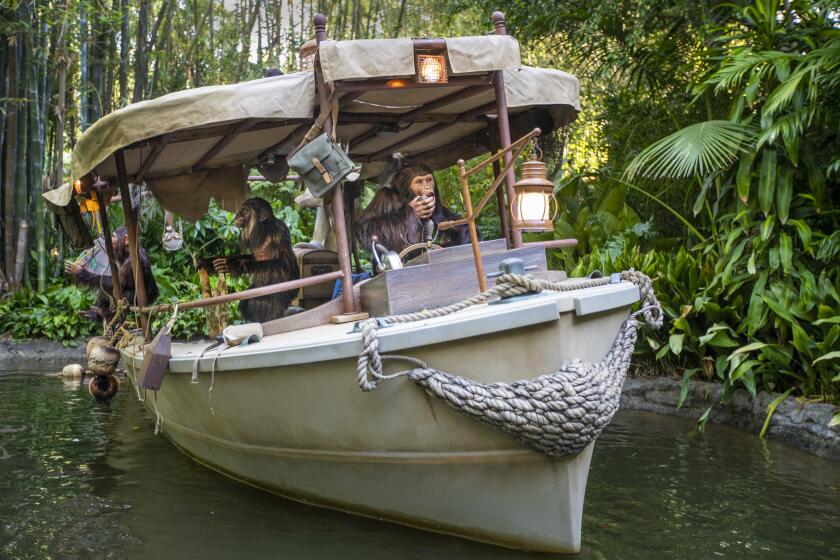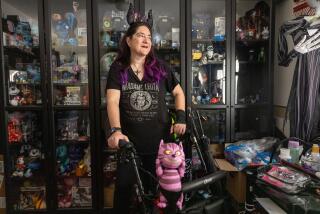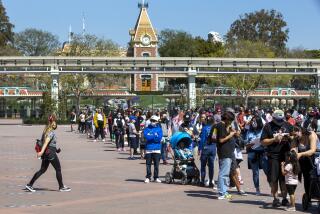Disney’s new annual pass system does not bring the real magic: vaccination requirements
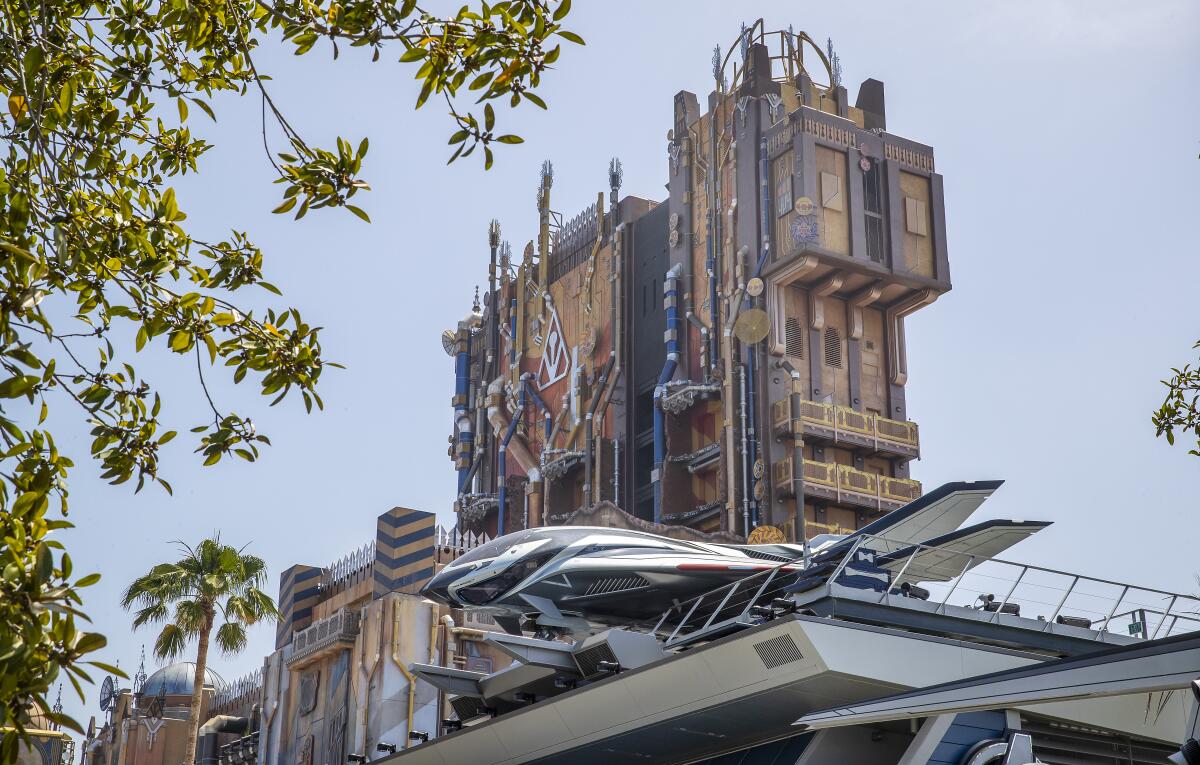
On Tuesday, seven months after the COVID-19 pandemic killed Disneyland’s annual passport program, hundreds of thousands of the theme park’s die-hard fans likely breathed a sigh of relief — the APs are back.
They’re called Magic Keys now, but beyond continuation of the parks’ reservation-based system, they look similar to the old program. Former passholders’ worst fears — that the new passes would be priced significantly higher or do away with a monthly payment plan — were not made manifest.
Transitioning passports to a reservation-based system is a step in the right direction, allowing the park’s biggest fans to maintain something akin to the level of access they had in the past while limiting the idea of Disneyland as a last-minute hang. But in this rapidly changing pandemic-scarred world, there’s still one more leap we’d like to see Disneyland — and all of Southern California’s theme parks — take.
In 2021, the only passport with any real currency is the one that documents your COVID-19 vaccination.
Restaurants, bars, theaters and even New York City are putting pressure on people to get vaccinated by requiring proof of shots or a negative COVID-19 test. Yet just days after Disney announced it would require much of its workforce to be vaccinated, none of the Magic Keys, or indeed any ticket to the resort, requires proof of vaccination.
A heartbreaking opportunity lost.
Whether you can stomach a day at a theme park or not, there’s no denying Disneyland’s cultural resonance. When the park, along with much of the state, shuttered in March 2020, it was an exclamation point for many on the gravity of this pandemic. A place of optimism — a park built on the belief in humanity’s ability to aspire to be better — had survived multiple wars, recessions and national crises.
But it was no match for a virus.
And when, on April 30, Disneyland celebrated its second proper grand opening since July 1955, it stood as a sign that we were emerging at long last from more than a year of trauma. We may not be healed, but we could once again visit a place with cross-generation memories embedded into its every square inch and celebrate the myths, stories and fairy tales that help us define our lives.
The new Disneyland Magic Key annual pass program, on sale starting Aug. 25, will require reservations, a change aimed at quelling overcrowding at the parks.
Given the devotion millions feel to the Disney resorts in California and around the world, it would have been nice to see the Magic Keys offer more than just discounts and free parking for its top $1,399 “Dream” key. A bolder nod to the modern war effort shouldn’t be a thing of fantasy. Schools can close, office buildings can empty but Disneyland remains a reset for many to life’s ills, a mini-respite from our pandemic highs and lows.
Last week, in light of rising cases, Disneyland reinstated a mask policy for indoor venues. But even some outdoor lines, such as those in Fantasyland, cram guests in so tightly that everyone is essentially sharing the same air, especially on windless SoCal days.
As Disneyland devotees know, great care is taken to maintain “the berm,” which prevents Anaheim’s skyline from penetrating our sightlines from the Magic Kingdom, but as long as the park isn’t fully pledging allegiance to science, it’s doing far less to prevent invasion by the highly infectious Delta variant.
As a regular parkgoer, I haven’t felt uncomfortable (although I do wear a KN95 mask at all times and avoid the tight lines of the re-imagined Snow White ride), but before the masking policy was reinstated, I did worry about children under 12, who are not yet eligible for vaccination. For them, for myself, for the families they return home to and for America’s continued attempt to escape the grip of this pandemic.
So why not require proof of vaccination or a negative COVID-19 test for all vaccine-eligible guests? Disney has already proved it’s logistically possible.
The French government is requiring a “health pass” to show proof of vaccination or a negative COVID-19 test to enter most venues, including Disneyland Paris, where there is an on-site testing center run by a third party. Why can’t that happen here at the flagship resort? After all, what are the recent changes to the classic Jungle Cruise ride to rid it of racist caricatures if not an attempt to grow with the times, to be a place where everyone feels welcome and comfortable?
Disneyland, Universal Studios and Knott’s Berry Farm shouldn’t be more virus-risky than local bars and restaurants such as Osteria La Buca, Akbar, the Short Stop, Gigi’s and Tramp Stamp Granny’s. Vaccine requirements aren’t just common sense for the common good of society; they’re also about the survival of our economy and our culture. So what is arguably Southern California’s most famous international destination should lead by example.
If this truly is — as that lovely Disney earworm tells us — a world of hopes and a world of fears, let’s make sure the emphasis stays on the hope.
The new Jungle Cruise shows Disney wants to be in the cultural conversation rather than an artifact or, worse, a representation of the ‘good ole days.’
More to Read
The biggest entertainment stories
Get our big stories about Hollywood, film, television, music, arts, culture and more right in your inbox as soon as they publish.
You may occasionally receive promotional content from the Los Angeles Times.
